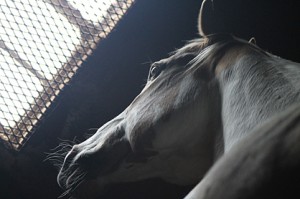One Study Shows Tapeworm Eggs Associated With Colic
Equine Science Update by: Mark Andrews
For a long time tapeworms (Anoplocephala perfoliata) were not thought to cause problems in horses. Then some studies, notably in England, found an association between tapeworms and certain types of colic. Other studies have not confirmed a link.
One of the problems with tapeworm infections is that of identifying which horses are infected. Standard fecal egg counting methods often do not detect the tapeworm eggs, which are only released into the feces intermittently.
Diagnosing tapeworm
The tapeworm anti-12/13 kDa IgG(T) ELISA antibody test gives an indication of the severity of infection levels. Modified fecal examination techniques methods have been devised to improve the detection of tapeworm eggs in the feces.
Recently, Helena Back and colleagues in Sweden carried out research into the relationship between tapeworm infection and colic. The case-control study involved 67 horses with colic and 67 horses with no recent history of colic. Clinical cases were matched with horses of similar age, and with no history of colic in the previous year, that attended the clinic within a week of each colic case.
The researchers used a modified flotation technique to detect tapeworm eggs and the anti-12/13 kDa IgG(T) ELISA blood test to give serological evidence of the degree of tapeworm infection. They found a significant association between the presence of A. perfoliata eggs in feces and colic. Horses were 16 times more likely to have colic if tapeworm eggs had been observed in their feces.
The study showed a significant association between high tapeworm ELISA optical density values and the detection of eggs of A. perfoliata in fecal samples. However, although the ELISA test appeared to be useful for detecting horses infected with A. perfoliata, this particular study did not find an association between antibody levels and colic.
The authors conclude that infection with Anoplocephala perfoliata is a risk factor for colic in horses in Sweden. They suggest that the modified flotation technique can be used to identify horses at risk.
For more details see:
The association between Anoplocephala perfoliata and colic in Swedish horses—A case control study
H. Back , A. Nyman, E. Osterman Lind
Veterinary Parasitology (2013) 197, pp 580–585











